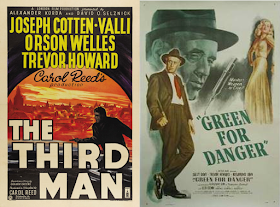Digging through the shelves last night I put together quite
a little program for myself. Since I wasn’t able to see the recent theatrical
rerelease, I pulled out my Blu-ray of Carol Reed’s The Third Man (1949) and
combined it with Sidney Gilliat’s Green for Danger (1946), making for an
impromptu Trevor Howard double feature (which wasn't my intention, no disrespect to Howard intended).
If you haven’t seen it, I can’t
recommend Green for Danger highly enough. It’s a sly wink in the direction of
the conventions of murder mystery fiction, Alastair Sim sending up with gusto
the notion of the omniscient investigator who manipulates witnesses and
suspects alike and who seems to be entirely on top of the situation, except
when he isn’t. To make things even more interesting, the movie is set in a
wartime hospital in the English countryside, German V-1 bombs dropping all
around while Sim’s Inspector Cockrill tries to figure out why a postman
entering the operating theater after being injured by a V-1 ended up dead, which
one of the surgical staff (among them, Howard, Leo Genn, Sally Gray, Rosamund
John, Judy Campbell and the wonderful Megs Jenkins) did him in, and who is next
on the killer’s list. I've seen this over and over again since I discovered it for myself about eight years ago, and even though I know whodunit, the fun of finding out sustains me every time.
Green for Danger went over extremely well as the second feature following The Third Man and its wholly different sort of murder mystery. There’s just no denying how
breathtaking and entertaining this movie is, or how thoroughly the presence of
Orson Welles affects the film, as Harry Lime of course, who gets perhaps the greatest extended
introduction in the history of cinema, but also as a director in his own right. Welles
claims he had nothing directly to do with Carol Reed’s conjuring of an eerily seductive
nocturnal Vienna through which Holly Martins (Joseph Cotten) and Harry’s lover,
Anna Schmidt (Alida Valli) pursue the not-quite-believable story of Lime’s
accidental death and the vaporous trail of murder and corruption left by his
ghost. But certainly the influence of Citizen Kane, The Magnificent Ambersons, The Stranger and The Lady from Shanghai can be felt through just about every
frame of this gorgeous, chilling picture, which only seems to get stronger as
both it and Reed’s critical standing seem to recede further into movie history.
(Spoiler alert: This time around I was shocked by how hard I was hit by the fate of poor Sergeant Paine. Paine, played by Bernard Lee, is the underling of Howard's cynical, brusque but patiently efficient Major Calloway, a stand-up fellow and apparently the only one in Vienna with any genuine appreciation for Martins' talent as a writer of pulp westerns. I went to sleep last night wondering why seeing him face down under the streets of Vienna felt like such a punch in the gut.)
(Spoiler alert: This time around I was shocked by how hard I was hit by the fate of poor Sergeant Paine. Paine, played by Bernard Lee, is the underling of Howard's cynical, brusque but patiently efficient Major Calloway, a stand-up fellow and apparently the only one in Vienna with any genuine appreciation for Martins' talent as a writer of pulp westerns. I went to sleep last night wondering why seeing him face down under the streets of Vienna felt like such a punch in the gut.)
My only complaint: I like “Harry Lime’s Theme” as much as
the next guy, but at the risk of being labeled a heretic at the altar of
classic cinema, I don’t much care for what Anton Karas’ indigenously styled zither
score does, or doesn’t do, for The Third Man. I’ve always found it both
heavy-handed and dramatically ineffective, and it often seems to exist on an
entirely different plane from the action of the images and the story. I think using
Karas’ strings was a bold choice and an interesting experiment, but I don’t
think it’s much of a success, and it’s a tribute to what Reed and Graham Greene
and cinematographer Robert Krasker and film editor Oswald Hafenrichter and the
movie’s stars all brought to the table that even over Karas’ incessant
strumming the movie works masterfully to hold the audience in its spell. Karas
drops out entirely once the movie hits the sewers, and The Third Man becomes
even more taut and suspenseful for the music’s absence. It made me wonder what
the movie would have been like with no conventional score at all.
Okay, heresy registered. You may now commence telling me how
I don’t know my zither from a hole in the ground.
*********************************




Are you telling us the Anton Karas does NOT put you in a dither with his zither?
ReplyDeleteI am dithering, but I am not zithering!
ReplyDeleteI agree, TTM's zither is as annoying as the electronic blather that passes as soundtrack for Forbidden Planet. The film itself, though, is sub-Lime.
ReplyDeleteI'd argue that the zither is central to the movie's overall tone and feel. It's the brisk sound of a foreign zone, of hidden menace. It's as important as the voiceover narration and the expressionistic angles and the Harry Lime speech. Cheers, Larry A.
ReplyDelete